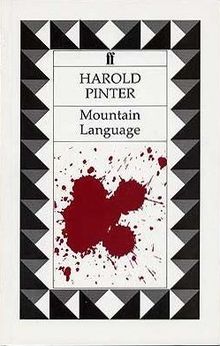- Mountain Language
-
Main article: Bibliography for Harold Pinter
Mountain Language is a one-act play written by Harold Pinter, first published in The Times Literary Supplement (TLS) on 7–13 October 1988. It was first performed at the Royal National Theatre in London on 20 October 1988 with Michael Gambon and Miranda Richardson. Subsequently, it was published by Faber and Faber (UK) and Grove Press (USA). Mountain Language lasts about 25 minutes in production.[1]
Contents
Background
According to a letter from Pinter to The Times Literary Supplement, where it was first published and advertised, that publication's "advertisement . . . stat[ing] that the play was 'inspired' by [Pinter's] trip to Turkey with Arthur Miller and is a 'parable about torture and the fate of the Kurdish people' ... [are] ... assertions ... made without consultation with the author [Pinter]"; he continues: "The first part of the sentence [that it was inspired by Pinter trip to Turkey with Miller] is in fact true. The play is not, however, 'about the fate of the Kurdish people' and, above all it is not intended as a 'parable'."[2] As Grimes points out, "Pinter evidently believes his political plays are too direct to be seen as metaphors or parables" (90). As Pinter insists in that letter, the text has more universal relevance: "this play is not about the Turks and the Kurds. I mean, throughout history, many languages have been banned––the Irish have suffered, the Welsh have suffered and the Urdu and the Estonians' language banned."[3] The dialogue does contain some identifiably-contemporary British or Western cultural references, thereby showing its applicability to the Great Britain of the present, but the text of the play contains no explicit geographical place setting and no explicit time setting, rendering its setting in place and time simultaneously indeterminate and thus also broadly relevant.[1]
Characters
The play involves four main characters: a Young Woman (Sara Johnson), an Elderly Woman, a Hooded Man (Charley Johnson, husband of the Young Woman) and an unnamed Prisoner (son of the Elderly Woman). These characters are in stark contrast to the Officer, Sergeant and guards of the prison where the Hooded Man and the Prisoner are captives.[1]
Thematic relevance of language
Like the world of Pinter's 1984 play One for the Road, the world of this play exposes the power of language (Merritt 171–209; 275; Grimes 80–100). Pinter's play may allude to political and cultural contexts of Great Britain in the 1980s headed by the Conservative Party of Margaret Thatcher, which, for example, forbade the television networks from broadcasting the voice of the leader of the Sinn Féin, Gerry Adams.[4]
Political theatre
Although Pinter says that he himself has always disliked agitprop in the theater, finding it an "insult" to his "intelligence," he is aware of "'that great danger, this great irritant to an audience' of 'agit-prop'" that his own overtly-political plays like One for the Road and Mountain Language pose.[5]
Notes
- ^ a b c "MOUNTAIN LANGUAGE - Review - Theater - New York Times". theater2.nytimes.com. http://theater2.nytimes.com/mem/theater/treview.html?res=950DE2D81F38F93AA35752C1A96F948260. Retrieved 2009-01-15.[dead link]
- ^ Harold Pinter, Letter, Times Literary Supplement, 7–13 October 1988: 1109, as cited by Merritt 186 and Grimes 90.
- ^ Grimes 90, citing Pinter's official Website, haroldpinter.org.
- ^ "The 'broadcast ban' on Sinn Féin". BBC News (London). 5 April 2005. http://news.bbc.co.uk/1/hi/uk_politics/4409447.stm. Retrieved 2009-01-15.
- ^ Harold Pinter and Nicholas Hern, "A Play and Its Politics: A Conversation between Harold Pinter and Nicholas Hern" (1985) 18, in Harold Pinter, One for the Road (New York: Grove P, 1986), as quoted in Merritt 182.
References
- Grimes, Charles. Harold Pinter's Politics: A Silence Beyond Echo. Madison and Teaneck, NJ: Fairleigh Dickinson UP; Cranbury, NJ: Associated U Presses, 2005. ISBN 0-8385-4050-8 (10). ISBN 978-08386-4050-0 (13).
- Merritt, Susan Hollis. Pinter in Play: Critical Strategies and the Plays of Harold Pinter. 1990; Durham and London: Duke UP, 1995. ISBN 0-8223-1674-9 (10). ISBN 978-08223-1674-9 (13).
- Pinter, Harold. Mountain Language. The Times Literary Supplement 7–13 Oct. 1988: 1110–11. New York: Grove P, 1989.
External links
- "Mountain Language" at HaroldPinter.org – The Official Website for the International Playwright Harold Pinter.
Categories:- Plays by Harold Pinter
- 1988 plays
- British plays
- Works originally published in The Times Literary Supplement
Wikimedia Foundation. 2010.

